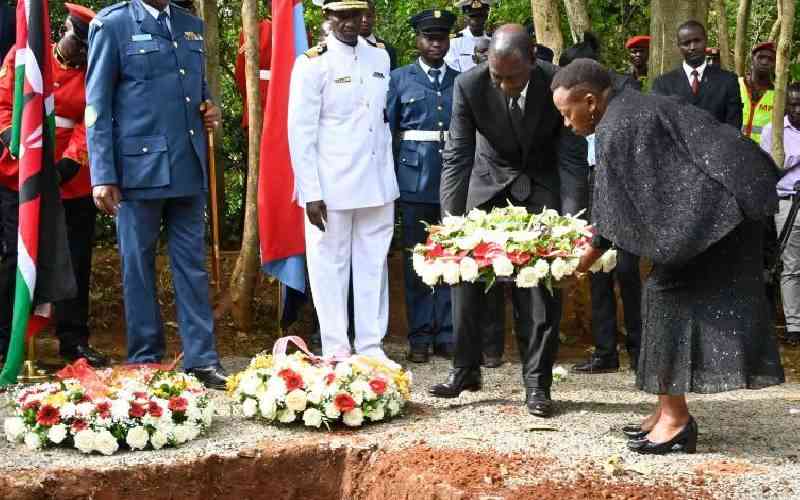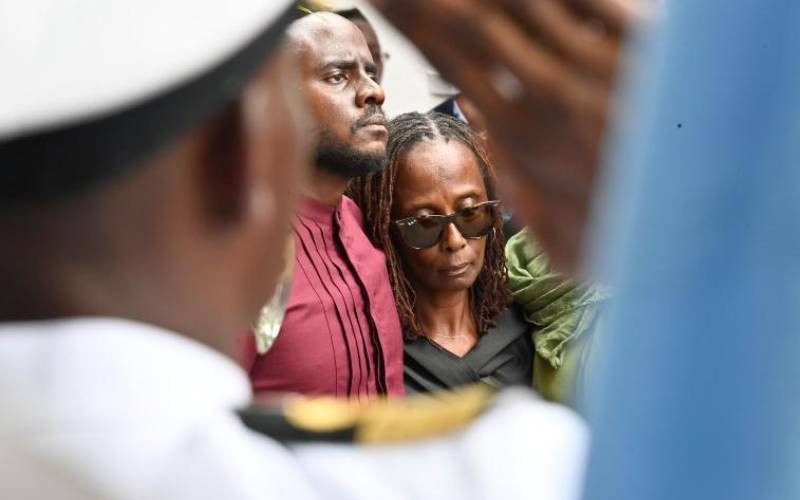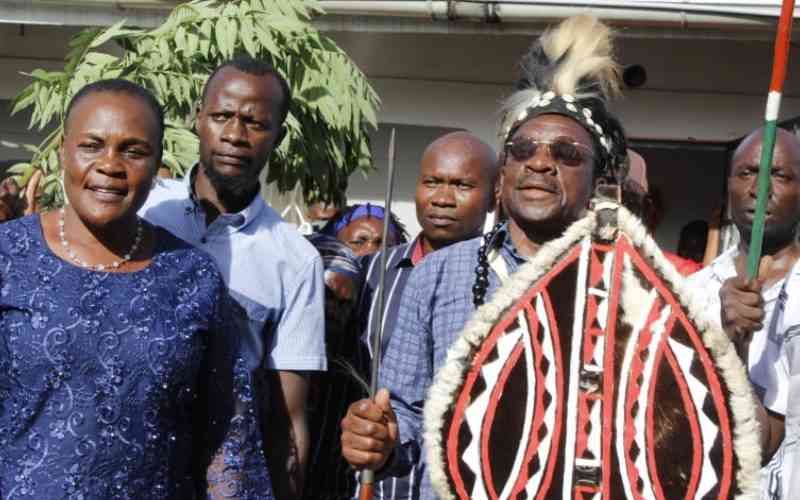The phrase “Pandora’s Box” comes from the ancient Greek story about a character named Pandora, who was given a box as a wedding gift but was ordered not to open it. Eventually, curiosity overcame her and she opened the box, releasing death, evil, and misery into the world.
These past few weeks, the media has gone gaga with a “scoop” called The Pandora Papers that seem to have excited many people in Kenya and internationally. To give these papers a Kenyan tint and a truly local smell, please, let’s just call them the Dandora Papers.
The excitement the Dandora Papers generated was huge. It sounded like Uhuru Kenyatta had finally been busted. With his hand in our national cookie jar. Pants down. With a smoking gun. I saw a Watergate scandal.
Lots of jokes have been flying about matters offshore. A naughty TM asked if a man keeping a secret family in another town is an offshore account.
The timing of this ‘earth-shaking’ revelations was curious. A couple of weeks earlier, Interior Cabinet Secretary Fred Matiang’i had unofficially tabled before Parliament DP William Ruto’s wealth declaration report. Though his brief was to explain to MPs why he had downscaled the DP’s security detail, he cheekily detailed out properties owned by Ruto across the country.
Naturally, Ruto and his allies were very angry. The release of the Pandora Box was the sweetest news to the DP and his brigade in a long time; and bad news to Uhuru Kenyatta, his family and comrades. From a pedestrian position, Ruto was giving Uhuru as much as he was receiving. Dirt for dirt. Belly punch for belly-punch. And in equal measure.
Anyone who has been following the rising political temperatures thought Ruto had done some digging and unearthed sufficient dirt on his former boss. Until it appeared that after all, it wasn’t Ruto.
The Pandora Papers is a leak of almost 12 million documents and files exposing the secret wealth and dealings of world leaders, politicians and billionaires.
Global investigations
The data was obtained by the International Consortium of Investigative Journalists in Washington DC and has led to one of the biggest ever global investigations. More than 600 journalists from 117 countries have exposed the hidden fortunes of some of the most powerful people on earth.
In 2016, the world went into a frenzy when a similar leak, known as The Panama Papers, took place. Thousands of confidential documents detailing offshore accounts were published, with the secrets of some of the world’s richest exposed. Citizens hit the streets in protest. They threw bananas and yoghurt in Iceland and rocks in Pakistan. Governments fell. Authorities launched hundreds of tax probes and criminal investigations. CNN columnist Frida Ghitis declared, “This is an earthquake.”
Then, like today, the media has been calling out politicians as corrupt and business tycoons as tax evaders. All these bring to mind a question that many people are asking: is offshore banking illegal?
Offshore banking has been associated with the underground economy and organised crime, tax evasion and money laundering. Information about them usually comes up in the news unveiling the global wealth stashes of politicians and business crooks. Thus, the general public’s unbiased knowledge of the offshore banking history and tax havens’ evolution is very limited. The term ‘offshore’ means ‘abroad’ for non-resident clients banking or dealing in the territory of a foreign country. The term offshore originates from the Channel Islands being “offshore” from the United Kingdom, and while most offshore banks are located in island nations to this day, the term is used figuratively to refer to any bank used for these advantages, regardless of location.
A ‘haven’ is a ‘hub’, though many associate it with the misspelled word ‘heaven’. Due to the privacy and tax security offered by individual countries, tax havens offer super-wealthy individuals a great opportunity to keep their money in offshore accounts for tax avoidance and other purposes. Offshore banking, is a segment of the finance industry whose birth can be traced back to Vienna, Austria. Offshore banking was born when the neutrality of Switzerland was established during the Vienna Congress in 1815.
Stay informed. Subscribe to our newsletter
Panama City, where Client 13173 (Uhuru Kenyatta) is alleged to have “hidden” his money is one of the Offshore Financial Centres, a term used to define a city, area, or country that provides a lot of tax incentives and other perks to international investors and nonresident clients of financial institutions. Obviously why the Kenyattas choose to keep their money in Panama.
In Belize, for instance, international accounts are immune from local taxes and exchange control regulations. Very much like Hong Kong, Germany, Cayman Islands, Singapore, Nevis, Seychelles and Mauritius among other havens. Seychelles does not tax the income of foreign banking customers, protects the privacy of their customers, bound by law to refrain from divulging customer account information. Until Pandora comes knocking.
In Cayman Islands, like Panama in the Caribbean, you undergo no direct taxation. You pay no capital gains tax, no corporate taxes, nor withholding, property, payroll, or income taxes. Additionally, there is no exchange control meaning that fund transfers coming in or going out of the islands are completely free in any currency. Sounds interesting, huh?
Clearing houses
Following the 9/11 attacks, there have been many calls to increase regulation on international finance, in particular concerning offshore banks, OFCs, crypto currency and clearing houses which are possible crossroads for major illegal money flows.
Back to Uhuru Kenyatta. The documents claim that a foundation called Varies was set up in 2003 in Panama. The foundation reportedly named Mama Ngina, Jomo Kenyatta’s widow, as the first benefactor, and President Kenyatta as the second benefactor.
The purpose of the foundation and the value of its assets were not disclosed. The same year, they say, UBP Private Wealth Advisers also helped Uhuru’s brother, Muhoho Kenyatta, to set up an entity in Panama called Criselle Foundation.
Probably, the tonnes and acres of paperwork that are the Pandora Papers make identifying other Kenyan names impossible. I suppose Uhuru’s name was easy to pick out.
Even as we ponder about these Dandora Papers, we must pause and rightly point a finger at our legal regime including the Central Bank of Kenya Act and other Acts of Parliament which are fundamentally weak and not useful in dealing with illicit money in foreign accounts. Tax avoidance involves operating within the letter, but not the spirit, of the law.
Kenyans are aware of offshore banking because of the court case against former Energy minister Chris Okemo and former Kenya Power Managing Director Samuel Gichuru, who have been fighting extradition to Jersey Island. The authorities there are properly briefed about the speed of our justice system. The case was filed in 2011. It moved from the Magistrate’s Court, to the High Court, Court of Appeal and now Supreme Court. If there was a Grand Supreme Court…
Perhaps, we should borrow a leaf from the American Foreign Account Tax Compliance Act (FATCA), which requires banks around the world to report balances and any activity of American citizens to the Internal Revenue Service (IRS) or face fines.
In 2020, a report by an American think tank, the National Bureau of Economic Research (NBER), revealed that Kenya’s super-rich were holding more than Sh5 trillion in offshore tax havens across the world. In 2007, Mwai Kibaki, in his element, commissioned an audit that detailed how corrupt networks looted at least Sh130 billion and stashed it in at least 30 countries abroad.
As Kenyans were gloating over Dandora Papers, Uhuru Kenyatta welcomed the leaks and suggested the need to ending secrecy of offshore transactions. He promised to make a comprehensive response when he comes back from Caribbean region.
Methinks if the Kenyatta family did not have offshore accounts, that would be the news. And I would recommend a full investigation with no stone left unturned.
Kutete Matimbai is a lawyer and child protection officer at West Special School, Bungoma
 The Standard Group Plc is a
multi-media organization with investments in media platforms spanning newspaper
print operations, television, radio broadcasting, digital and online services. The
Standard Group is recognized as a leading multi-media house in Kenya with a key
influence in matters of national and international interest.
The Standard Group Plc is a
multi-media organization with investments in media platforms spanning newspaper
print operations, television, radio broadcasting, digital and online services. The
Standard Group is recognized as a leading multi-media house in Kenya with a key
influence in matters of national and international interest.
 The Standard Group Plc is a
multi-media organization with investments in media platforms spanning newspaper
print operations, television, radio broadcasting, digital and online services. The
Standard Group is recognized as a leading multi-media house in Kenya with a key
influence in matters of national and international interest.
The Standard Group Plc is a
multi-media organization with investments in media platforms spanning newspaper
print operations, television, radio broadcasting, digital and online services. The
Standard Group is recognized as a leading multi-media house in Kenya with a key
influence in matters of national and international interest.









